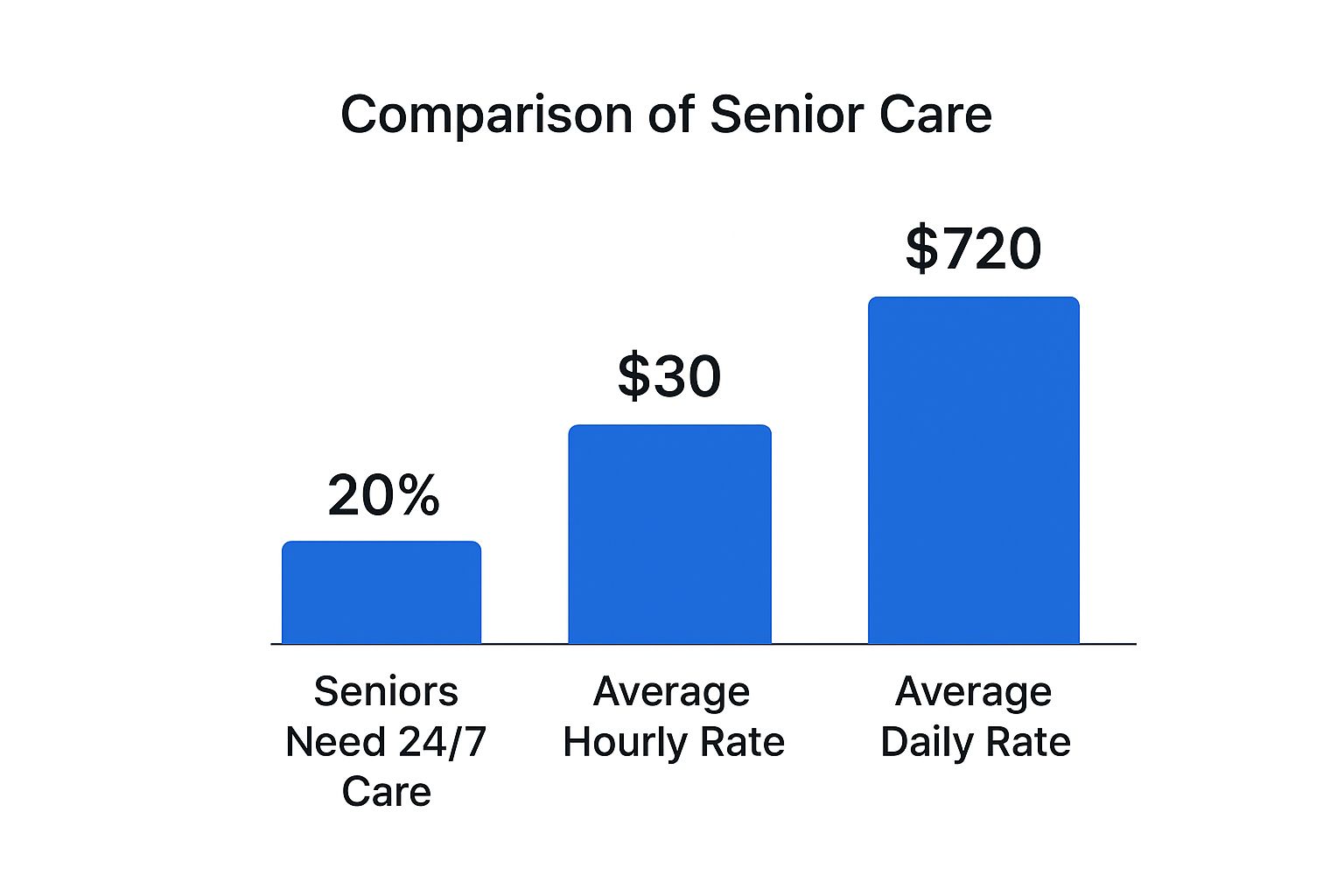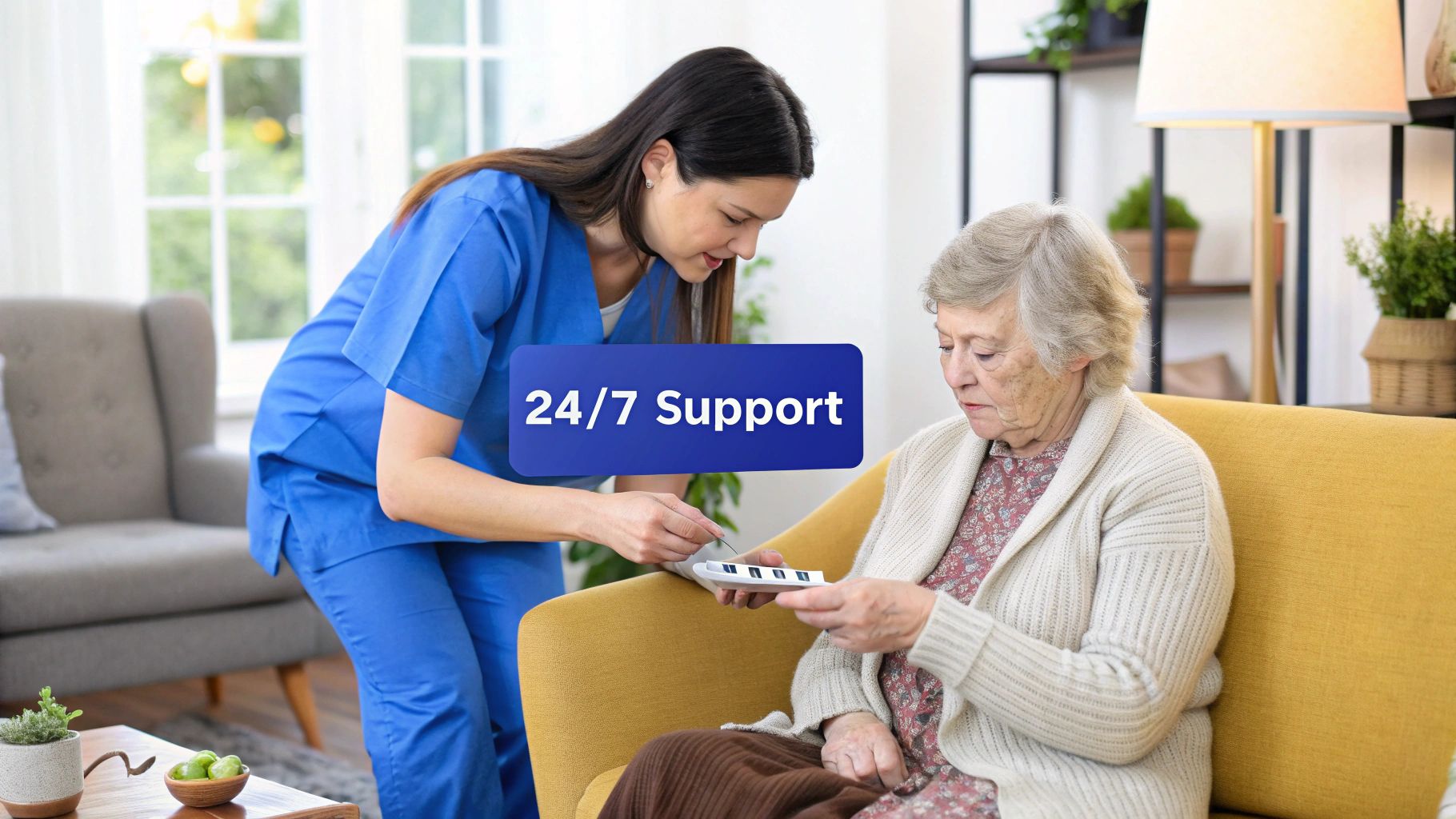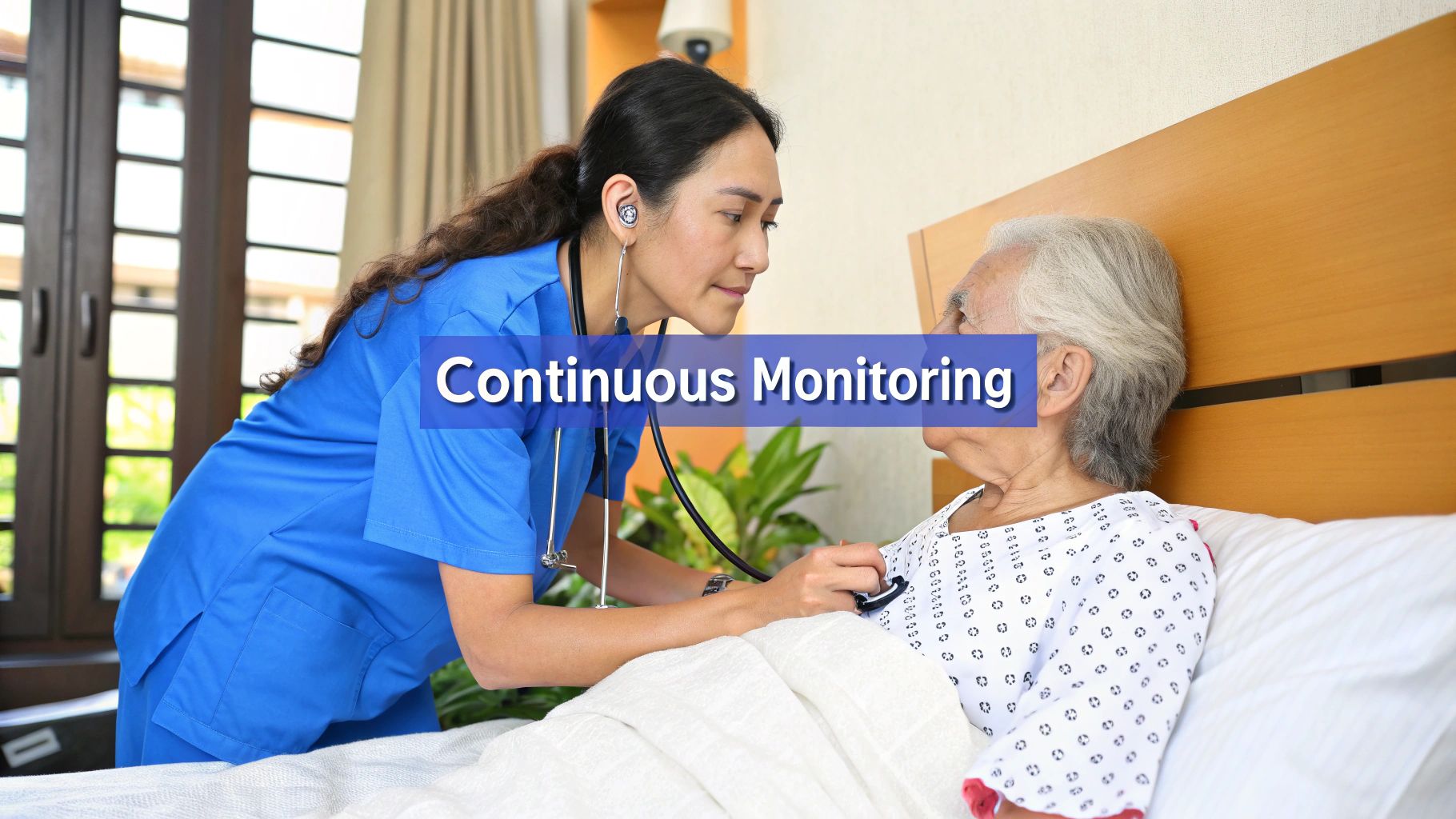When a loved one needs constant attention, 24-hour home care offers the most comprehensive level of support you can get right at home. It involves a team of caregivers working in shifts to provide continuous, around-the-clock supervision and assistance.
This setup ensures that someone is always awake, alert, and ready to help. It’s a crucial distinction from live-in care, where a single caregiver resides in the home and has designated rest periods.
Understanding What Around-The-Clock Support Truly Involves
The idea of having support at any hour brings immense relief, but what does it really look like? Think of true 24-hour home care as a seamless relay race. Multiple caregivers—usually two or three—work in 8- or 12-hour shifts, handing off duties so that your loved one is always under the watch of a fresh, focused professional.
This is fundamentally different from live-in care. While a great option for many, a live-in caregiver lives in the home and needs their own time for sleep and personal breaks. 24-hour care is designed for those who simply cannot be left unattended, even for a moment.
Who Benefits Most From 24-Hour Home Care?
This intensive level of support is a lifeline for individuals facing very specific health challenges. It provides a critical safety net, ensuring an immediate response to any need, day or night.
The people who benefit most often include:
- Individuals with advanced dementia or Alzheimer's: For those prone to wandering, sundowning, or frequent confusion, constant supervision is essential to prevent accidents.
- Clients recovering from major surgery: Post-operative care often demands frequent monitoring, help with pain management, and mobility assistance that can't wait.
- People with complex medical needs: Conditions that require frequent repositioning to prevent bedsores, specialized feeding, or monitoring of vital signs are a perfect fit for continuous oversight.
- Those at a high risk for falls: Frail seniors or individuals with serious mobility issues gain a crucial layer of protection, as a caregiver is always present to help them move safely.
The core promise of 24-hour home care is unwavering presence. It’s the peace of mind that comes from knowing that no matter the time—2 AM or 2 PM—a dedicated professional is there to ensure safety, comfort, and dignity.
To better understand the differences between the main types of in-home care, it helps to see them side-by-side.
Comparing In-Home Care Options
| Care Type | Typical Coverage | Ideal For | Caregiver Staffing |
|---|---|---|---|
| 24-Hour Care | 24/7, awake and alert | High-risk individuals, complex medical needs, post-surgery recovery, advanced dementia. | Team of caregivers working in 8-12 hour shifts. |
| Live-In Care | Caregiver lives in the home | Seniors needing companionship and help with daily tasks but can be alone for short periods. | One primary caregiver who has designated sleep/personal breaks. |
| Hourly Care | A few hours a day/week | Individuals needing help with specific tasks like bathing, meal prep, or transportation. | One or more caregivers for scheduled blocks of time. |
This table makes it clear that the choice really depends on the intensity of care required. While hourly and live-in care are excellent for many situations, only 24-hour care guarantees an awake caregiver is on duty at all times.

The data here really drives the point home. There's a significant and growing need for this level of service among the senior population, but it also highlights the substantial financial commitment required. By understanding these realities, families can better prepare and decide if this comprehensive care model is the right fit for their loved one's needs and their financial planning.
Understanding the Cost of Around-The-Clock Care

Talking about money is often the hardest part of planning for care, but it's also the most critical. When it comes to 24-hour home care, the cost isn't a simple, one-size-fits-all number. It’s a dynamic figure that changes based on a handful of very important factors.
Think of it like getting a custom quote for a home renovation. The final price depends on your location, the scope of the work, and the level of expertise required. The same logic applies here—the cost of care is tailored to your family's specific needs.
Key Factors That Influence The Price
Several variables will directly shape the total cost of care. Getting familiar with these elements helps you understand exactly where your investment is going and why prices can vary so much from one situation to the next.
- Geographic Location: Just like real estate, care costs are local. Major cities and states with a higher cost of living naturally have higher hourly rates for professional caregivers.
- Level of Care Required: This is a big one. Is the main need for companionship and help around the house, or does your loved one require more intensive medical support? A registered nurse's time will cost more than that of a non-medical aide.
- Specialized Expertise: Conditions like advanced dementia, Parkinson’s, or post-surgery recovery demand caregivers with specific training and certifications. That specialized skill set is rightly reflected in the cost.
All these pieces come together to form a personalized price. For a much deeper dive into how these variables play out, check out our guide on decoding in-home care costs.
A Look At The National Averages
To start building a realistic budget, it helps to have a baseline number in mind. As of 2025, the national median cost for a non-medical home health aide is about $31 per hour.
Now, let's do the math for 24-hour care. With 168 hours in a week, you're looking at an estimated weekly cost of $5,208. That comes out to roughly $22,568 per month.
Remember, this is a national median. Your actual costs could be higher or lower depending on where you live and, most importantly, the specific level of care your loved one needs.
For most families, seeing that number really underscores the importance of planning. It’s not just another bill; it’s a major investment in a loved one's safety, comfort, and quality of life at home.
How To Pay For 24-Hour Home Care
That number can feel daunting, but it doesn't mean round-the-clock care is out of reach. Families typically pull from a few different resources to create a sustainable financial plan. The key is to start exploring your options early.
Here are the most common ways families fund this level of support:
- Long-Term Care Insurance: This is exactly what these policies are for. If you have one, now is the time to review the daily benefit amount and any waiting periods to understand exactly what it covers.
- Private Funds and Savings: Many families rely on personal assets—savings, pensions, retirement accounts, or even the sale of property—to pay for care directly.
- Veterans Affairs (VA) Benefits: If your loved one is an eligible veteran, they may qualify for programs like the Aid and Attendance benefit. This provides a monthly payment that can be used to offset in-home care costs.
- Medicaid Waiver Programs: For those who meet specific income and asset limits, state-run Medicaid waivers can be a lifesaver. These programs are designed to cover home and community-based services to help people stay out of nursing facilities.
Each of these avenues has its own set of rules and application processes. Talking to a financial planner or an elder law attorney can make a world of difference in helping you build a solid strategy to provide the best care possible.
What Services Are Included in 24 Hour Home Care

When you hear 24 hour home care, it’s easy to picture someone simply being present in the house around the clock. But it’s so much more than that. Think of it as a comprehensive support system, thoughtfully designed to cover every aspect of a person's well-being, day and night.
This level of care is built on two key ideas: supporting the person directly and maintaining their home environment. These pillars ensure someone can live safely and with dignity, no matter what challenges they face.
Common 24-Hour Home Care Services
To give you a clearer picture, let's break down the typical tasks and support a caregiver provides. This table shows just how extensive these services can be, covering everything from basic personal needs to more complex household management.
| Service Category | Example Tasks |
|---|---|
| Personal Care (ADLs) | Assisting with bathing, grooming, dressing, toileting, and safely moving around the home. |
| Household Support (IADLs) | Preparing nutritious meals, handling light housekeeping, doing laundry, and running essential errands like grocery shopping. |
| Health Management | Providing timely medication reminders and helping manage schedules for doctor's appointments. |
| Companionship | Engaging in conversation, playing games, reading aloud, and offering emotional support to combat loneliness. |
| Specialized Care | Assisting with dementia-related behaviors (like sundowning), supporting post-surgery recovery, and providing comfort care. |
As you can see, the goal is to create a seamless circle of support that addresses both the individual’s direct needs and the environment they live in.
Hands-On Help with Daily Personal Tasks
At its core, 24 hour care focuses on the essential self-care routines known as Activities of Daily Living (ADLs). These are the fundamental tasks we all do to care for ourselves, but they can become difficult or unsafe for someone dealing with illness, injury, or age-related challenges.
A caregiver provides respectful, hands-on assistance with things like:
- Bathing and Hygiene: Helping with showers, baths, and grooming to keep your loved one comfortable and clean.
- Dressing and Undressing: Assisting with clothing choices and the physical act of getting dressed, which can be tough with limited mobility.
- Toileting and Continence Care: Offering dignified support for using the restroom and managing incontinence with sensitivity.
- Mobility and Transfers: Safely helping a person get from a bed to a wheelchair, walk through the house, or change positions to prevent pressure sores. This is a huge factor in preventing falls.
Meeting these basic needs consistently is the foundation of any effective round-the-clock care plan.
Keeping the Home Safe and Running Smoothly
Beyond direct personal care, a caregiver also handles the tasks that keep a household functional and organized. These are called Instrumental Activities of Daily Living (IADLs). While they aren't about direct body care, they are absolutely vital for maintaining a safe and independent lifestyle.
You can think of IADLs as the scaffolding that supports a person's daily life. We cover these in more detail in our guide about what are instrumental activities of daily living.
Some of the most common IADLs include:
- Meal Planning and Preparation: Cooking healthy meals tailored to dietary needs and making sure the person is eating regularly.
- Medication Reminders: Keeping your loved one on schedule with their prescriptions—a critical task for managing chronic conditions.
- Light Housekeeping: Taking care of laundry, washing dishes, and tidying up to maintain a clean, pleasant home.
- Errands and Shopping: Picking up groceries, prescriptions, and other necessities so the house is always well-stocked.
By managing these responsibilities, caregivers not only ensure the home is a place of comfort but also lift a significant burden from family members.
Advanced Support for Complex Health Needs
Here’s where 24 hour home care truly shows its value. This level of support is incredibly adaptable and can be tailored to complex medical conditions and recovery situations. It’s not just about being there; it’s about providing skilled, specialized care when it matters most.
A dedicated 24-hour caregiver provides the continuous monitoring and proactive support needed for serious health challenges. This constant presence helps manage symptoms, prevent emergencies, and gives families true peace of mind.
This specialized support is often essential for individuals dealing with:
- Dementia and Alzheimer’s: Managing challenging behaviors like sundowning or wandering and maintaining a safe, calming routine.
- Post-Surgery Recovery: Assisting with doctor-prescribed recovery protocols, watching for signs of infection, and helping with mobility exercises.
- Chronic Illness Management: Supporting those with Parkinson's, COPD, or diabetes by monitoring symptoms and assisting with any necessary medical equipment.
- Hospice Support: Working in tandem with hospice teams to provide comfort, manage pain, and offer compassionate companionship.
This ability to provide condition-specific care transforms a caregiver from a helper into an active and vital member of a person's healthcare team.
The True Benefits of Continuous In-Home Support
While a list of services can tell you what caregivers do, it doesn't quite capture the real, profound impact 24-hour home care has on a family. The true value is in the benefits you can't always put on a checklist—the ones that ripple through the lives of both the person receiving care and their loved ones. It’s about so much more than just tasks; it’s about restoring a sense of security and well-being for everyone.
For family members, the single greatest benefit is an immense and immediate feeling of peace of mind. That constant, nagging worry—Did Mom fall? Did Dad remember his medication?—finally starts to fade. Knowing a trained professional is always there replaces that persistent anxiety with genuine reassurance.
This continuous supervision creates a much safer home environment. The risk of a fall, one of the most common and dangerous threats for seniors, drops significantly when a caregiver is always there to offer a steadying hand.
Enhancing Safety and Immediate Response
In an emergency, every single second counts. With round-the-clock support, there's no delay in getting help. A caregiver can spot a problem right away, from a sudden downturn in health to an unexpected fall, and take immediate action. That rapid response can make all the difference in a crisis.
Think about the alternative for a moment. If a person lives alone, a fall in the middle of the night could leave them helpless for hours. With 24-hour home care, that entire scenario is off the table. This safety net provides an invaluable layer of protection that intermittent care just can't match.
Beyond emergencies, this constant presence also stops smaller issues from spiraling. For instance, a caregiver can notice the early signs of a urinary tract infection or dehydration and ensure medical attention is sought before it becomes a much bigger problem.
The real product of 24-hour home care isn’t just assistance—it’s security. It’s knowing that no matter what happens, at any time of day or night, your loved one is not alone and is in capable hands.
Preserving Dignity and Fostering Independence
For the person receiving care, the benefits are deeply personal. Staying in their own familiar, comfortable home is a powerful way to hold on to their sense of self and dignity. They're surrounded by their own memories, their routines, and the simple comforts of their own space, which is incredibly grounding.
This model of care empowers them to age in place safely. Instead of having to move to a facility, they can continue living right where they feel they belong, preserving their independence for as long as possible. The one-on-one support is shaped entirely around their preferences, from meal times to daily activities, respecting them as an individual.
Combating Loneliness and Improving Well-Being
One of the most overlooked benefits of continuous in-home support is consistent companionship. Loneliness is a serious health risk for seniors, often linked to depression and a decline in cognitive health. An around-the-clock caregiver becomes a trusted companion, a friendly face, and a vital source of social interaction.
This consistent relationship provides:
- Emotional Support: A caregiver offers a listening ear and encouragement, helping to ease feelings of isolation.
- Mental Stimulation: Engaging in conversation, playing card games, or reading together helps keep the mind active and sharp.
- A Sense of Connection: Just having someone to share the day with creates a feeling of normalcy and connection to the world outside.
This one-on-one bond is something that larger, institutional settings often struggle to provide. By meeting both the physical and emotional needs of a person, 24-hour home care supports a richer, more fulfilling quality of life.
How to Find a Reputable Home Care Provider

Choosing an agency to provide 24 hour home care is one of the biggest decisions your family will ever make. You’re not just hiring a service; you're inviting a team of professionals into your home to care for someone you love. The right provider becomes a trusted partner in your loved one's well-being, but the wrong one can bring a lot of stress and uncertainty.
The whole process takes some real diligence and a clear plan. If you focus on a few key areas—like credentials, caregiver quality, and communication—you can confidently pick an agency that fits your family’s values and, most importantly, your loved one’s needs.
Begin Your Search and Vet Credentials
First things first, you need to find licensed and insured home care agencies in your area. The best place to start is by asking for recommendations from people you trust, like your doctor, a hospital discharge planner, or even friends who've been through this before. Online searches help, too, but you have to look past the shiny websites.
Once you’ve got a short list, your main goal is to check their legitimacy and commitment to quality. This is where you build the foundation for trust.
- Licensing and Insurance: Make sure the agency is licensed by the state and carries liability insurance. This is a non-negotiable that protects your family from financial risk if an accident happens.
- Bonding: Ask if the agency is bonded. This gives you an extra layer of protection against things like theft or misconduct.
Don't be shy about asking for proof of these credentials. Any reputable agency will be transparent and happy to show you their documentation. This simple screening step helps you weed out the less professional outfits right away.
The Interview Process and Key Questions to Ask
After you’ve confirmed the basics, it's time to interview your top candidates. This is your chance to really understand their philosophy and how they handle the day-to-day realities of around-the-clock care.
Think of it less like a formal Q&A and more like a conversation to get a feel for their expertise, compassion, and reliability. It's smart to have a list of questions ready so you don’t forget to cover the critical stuff.
The quality of a 24 hour home care provider is defined by its people and its processes. How they recruit, train, and support their caregivers directly translates to the level of care your loved one will receive.
Here are some essential questions to get the discussion rolling:
- Caregiver Screening: "What does your screening process for caregivers involve?" You want to hear about comprehensive background checks, reference verifications, and in-person interviews.
- Training and Specialization: "What kind of initial and ongoing training do your caregivers receive?" Be sure to ask about training for any specific conditions your loved one has, like dementia or post-surgery support.
- Supervision and Oversight: "How is caregiver performance monitored? Who supervises the care plan?" A good agency will have a registered nurse or a care manager who does regular check-ins.
- Emergency Protocols: "What is your procedure if a caregiver can't make their shift or if there's a medical emergency?" You need to feel confident they have a solid backup plan to ensure there are never any gaps in coverage.
Matching Personalities and Finalizing the Agreement
Technical skills are crucial, but the human element is just as important. The relationship between a caregiver and your loved one is truly the heart of quality home care. A good personality match can lead to wonderful companionship, while a mismatch can create discomfort for everyone.
Ask the agency how they match clients with caregivers. Do they take things like personality traits, interests, and communication styles into account? Most top-tier providers will set up a "meet and greet" before care officially starts, giving you and your loved one a chance to meet the proposed caregiver. This is a vital step for getting things off to a positive start.
Finally, before you sign anything, read the service agreement carefully. Make sure it clearly spells out all costs, services, and policies. Pay close attention to things like cancellation policies and how they handle resolving any issues that might come up.
For those thinking about hiring someone directly instead of going through an agency, it's good to know the differences. You can learn more about how to find private caregivers to see which approach is right for you. Taking these careful steps will help you find a reliable partner for your 24 hour home care journey.
The Hard Truth About the Caregiver Shortage
If you're finding it tough to secure consistent 24 hour home care, you're not alone. It's a challenging situation, and it helps to understand what's happening behind the scenes. Across the country, families are bumping up against a significant caregiver shortage—a workforce trend that's impacting the entire home care industry, not just one or two agencies.
At its core, it’s a simple case of supply and demand. The number of seniors in the baby boomer generation who need support is skyrocketing, far outpacing the number of people choosing caregiving as a career. This imbalance makes staffing those complex around-the-clock cases, which require a whole team of caregivers, especially difficult.
What the Numbers Tell Us
The demographic shifts really paint a stark picture. The population of Americans aged 65 and over is expected to jump from 57.8 million in 2022 to nearly 88.8 million by 2060. That's a massive surge in the need for care.
Unfortunately, the workforce just isn't keeping up. By 2025, some states like Georgia and Nevada will face an alarmingly low ratio of fewer than 8 caregivers for every 1,000 residents needing help. Even in states with better coverage, like Massachusetts with about 22 caregivers per 1,000 residents, the system is feeling the strain. You can learn more about these home care industry trends and how they're affecting families like yours.
How Your Family Can Plan Ahead
Knowing about the shortage isn't meant to discourage you; it's meant to empower you. You can take smart, practical steps to work around this reality and find reliable care for your loved one.
- Don't Wait for an Emergency: Start your search early. Researching and interviewing agencies before you're in a crisis gives you far more options and breathing room. It also gives the agency a better chance to build the perfect care team from the ground up.
- Paint a Clear Picture: Give potential agencies a detailed rundown of your loved one's needs—from their medical condition and personality to their daily routines. The more they know, the better they can match you with the right caregivers.
- Recognize the Family's Role: Even when you hire professionals, your involvement is crucial. A supportive family atmosphere goes a long way in helping retain great caregivers and ensures everyone is on the same team, working toward the best possible outcome.
The caregiver shortage is a real hurdle, but it doesn't have to be a dead end. With a bit of forward-thinking and by asking the right questions, you can find a stable, high-quality provider who can deliver the continuous care your loved one deserves.
When you sit down with agencies, ask them about this issue directly. How do they recruit? What's their strategy for keeping their best caregivers happy? An agency that boasts low turnover and a strong support system for its staff is much more likely to provide the consistent, reliable 24 hour home care you're looking for.
Common Questions About 24-Hour Home Care
Even after learning the basics, it’s completely normal to have more questions bubbling up. When families start seriously considering around-the-clock support, a few key concerns almost always come to mind. Let's tackle them head-on.
Does Medicare Pay For 24 Hour Home Care?
This is easily one of the most common questions, and the short answer is, unfortunately, no. Traditional Medicare does not cover non-medical, custodial 24-hour home care. Its purpose is to fund short-term, skilled medical care at home as prescribed by a doctor, usually after a hospital discharge.
While a handful of Medicare Advantage (Part C) plans might offer some limited in-home support benefits, it's very rare for them to cover continuous, 24/7 care. For that level of comprehensive support, families almost always turn to other resources.
The most common ways to pay for around-the-clock care are through long-term care insurance policies, private funds and savings, or certain state-level Medicaid waiver programs designed to help people age safely in their own homes.
How Many Caregivers Does It Take For 24-Hour Care?
True 24-hour home care is a team sport. You can expect a team of two to four caregivers who work in shifts, typically in 8 or 12-hour blocks.
This setup is crucial because it guarantees there is always a caregiver who is awake, alert, and ready to provide focused support. It’s a very different model from live-in care, where a single caregiver lives in the home but requires their own dedicated time for sleep and personal breaks.
Can We Meet and Interview the Caregivers Before They Start?
Absolutely. In fact, you should insist on it. Any reputable home care agency will not only allow but will actively encourage a "meet and greet" before the first shift begins. This gives you, your loved one, and the potential caregiver a chance to connect.
This is a vital step. A good personality fit is the bedrock of a comfortable and trusting care relationship. When you’re speaking with an agency, always make it a point to ask about their process for matching clients with caregivers and how they facilitate these important introductions.
At NJ Caregiving, we know that finding the right care is a deeply personal journey. We're here to provide compassionate, reliable 24-hour support that fits your family's unique needs in Princeton, NJ, and the surrounding Mercer County area. To learn more about how our skilled caregivers can bring you peace of mind, visit us at https://njcaregiving.com.



